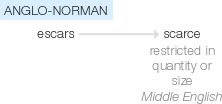Scarce
Middle English (in the sense ‘restricted in quantity or size’, also ‘parsimonious’): from a shortening of Anglo-Norman escars, from a Romance word meaning ‘plucked out, selected’.
wiktionary
From Middle English scarce, skarce, scarse, scars, from Old Northern French scars, escars("sparing, niggard, parsimonious, miserly, poor"; > French échars, Medieval Latin scarsus(“diminished, reduced”)), of uncertain origin. One theory is that it derives originally from a Late Latin *scarpsus, *excarpsus, a participle form of *excarpere(“take out”), from Latin ex- + carpere; yet the sense evolution is difficult to trace. Compare also Middle Dutch schaers(“sparing, niggard”), Middle Dutch schaers(“a pair of shears, plowshare”), scheeren(“to shear”).
etymonline
scarce (adj.)
c. 1300, "restricted in quantity," from Old North French scars "scanty, scarce" (Old French eschars, Modern French échars) from Vulgar Latin *scarsus, from *escarpsus, from *excarpere "pluck out," from classical Latin excerpere "pluck out" (see excerpt). As an adverb early 14c. from the adjective. Phrase to make oneself scarce "go away" first attested 1771, noted as a current "cant phrase." Related: Scarcely.
